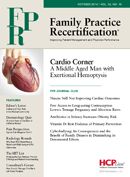Antibiotics in Infancy Increases Obesity Risk
A study of the affect prescribing drugs during infancy can have on childhood obesity
Frank J. Domino, MD
Review
Study Methods
This was a cohort study based on a 12-year retrospective review of electronic health records of the pediatric practices associated with the Children’s Hospital of Philadelphia. The age range for this study included 0-23 months with follow up visits between ages 24-59 months. Total population was almost 65,000 children. The children were evaluated for treatment with prescribed antibiotics up to age 23 months and subsequent growth.
Results and Outcomes
In this pediatric practice cohort, the majority, or approximately 69% of children received antibiotics before 24 months. This exposure correlated with obesity at a later age (relative risk = 1.11; CI: 1.02-1.21 for those receiving 4 or more episodes of antibiotics). This risk was strongest for broad-spectrum antibiotics (relative risk = 1.11; CI: 1.03-1.19 at 5 months of age, and relative risk = 1.09; CI: 1.04-1.14 at 6-11 months of age) as narrow-spectrum antibiotics did not increase the risk based upon age or based upon frequency of exposure. Other factors that correlated with increased risk of obesity included corticosteroid exposure, male gender, urban practice, public insurance, Hispanic ethnicity, and a diagnosis of asthma or wheezing. Other common pediatric infectious diagnoses and the use of anti-reflux medication did not correlate with obesity.
Conclusions
Repeated exposure to broad spectrum antibiotics during the first 24 months of life increases the risk of early childhood obesity.
Commentary
The CDC has reported 1 in every 3 children and adolescents in the US are categorized as obese or overweight (http://www.cdc.gov/healthyyouth/obesity/facts.htm). The implications of this can only be estimated but includes an increased risk from type 2 diabetes, hyperlipidemia, hypertension, and cardiovascular disorders. For the first time in recorded history, public health officials question if future generations will have a shorter life expectancy than its predecessors based upon the risks induced by obesity.
A number of r factors influence the risk of childhood obesity. These include 2 factors that can be altered: maternal pre-pregnancy BMI, and the microbiome of the child. Identifying women who wish to get pregnant and making weight control a pre-conception topic can lower this risk. The infant’s microbiome is influenced by the gut being colonized at birth and a variety of external factors including diet. While not proven, this study furthers the relationship between gut bacteria and antibiotic exposure. It suggests the child’s exposures (antibiotics, types of food, etc.) play a role in obesity.
Antibiotics were the most commonly prescribed medication in the first 24 months of life in this cohort. On average, children received 2.3 antibiotic episodes in this time frame. Almost 70% were exposed to at least one narrow spectrum antibiotic and approximately 40% to at least one broad spectrum antibiotic. Age played a factor when antibiotics were prescribed. In the first 6 months of life, 14% of children received an antibiotic prescription, but in months 6-12, 12-18, and 18-24 months between 40% and 45% of the children received an antibiotic. The most common diagnoses for receiving an antibiotic were pharyngitis and otitis media.
The authors urge primary care providers that care for children (pediatricians, family physicians, and emergency room providers) to heed recommended guidelines around the management of pediatric infections. A conservative approach toward treating infections, typically without antibiotics, should cover most children from age 3-24 months of life.
When antibiotics are indicated, first-line, narrow-spectrum antibiotics should be used. Broad- spectrum antibiotics (azithromycin, clarithromycin, cephalosporins, etc.) should be considered only when absolutely necessary based upon appropriate guidelines and patient centered decision making. Convenience of dosing and assumptions about parental preference must not be substituted for the best care we can offer, as our actions can lead to a lifetime of problems.
About the Author
Frank J. Domino, MD, is Professor and Pre-Doctoral Education Director for the Department of Family Medicine and Community Health at the University of Massachusetts Medical School in Worcester, MA. Domino is Editor-in-Chief of the 5-Minute Clinical Consult series (Lippincott Williams & Wilkins).
Additionally, he is Co-Author and Editor of the Epocrates LAB database, and author and editor to the MedPearls smartphone app. He presents nationally for the American Academy of Family Medicine and serves as the Family Physician Representative to the Harvard Medical School’s Continuing Education Committee.
